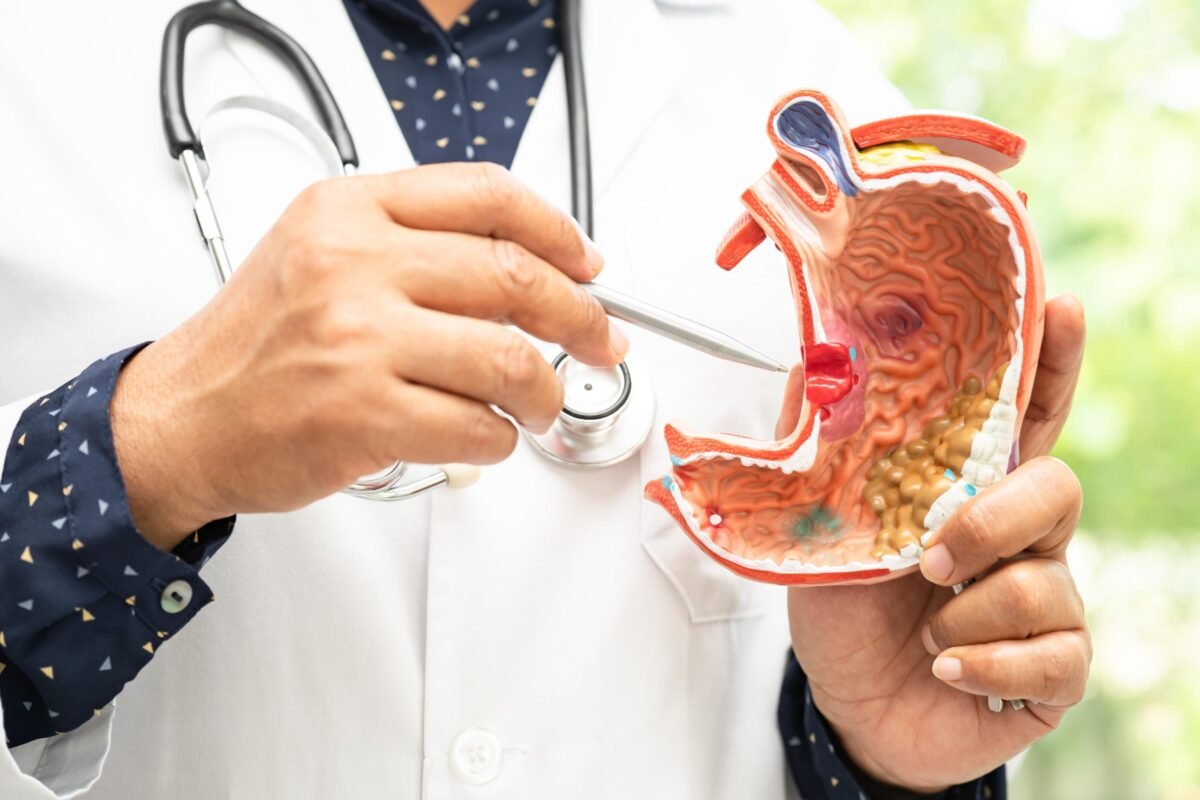Lifestyle Habits That Increase Your Risk of Gastrointestinal (GI) Cancer

Gastrointestinal (GI) cancers refer to a group of cancers that affect the digestive system, including the stomach, colon, rectum, pancreas, oesophagus, liver, and small intestine. These cancers are not only common but also responsible for a large number of cancer-related deaths around the world. While it’s true that factors such as age, genetics, and family history can increase your risk, you will be surprised to learn that lifestyle choices also play a significantly larger role than we might think.
According to research, a significant portion of GI cancers are preventable. Every day habits, such as what we eat, how active we are, whether we smoke or drink, and how we manage stress, can either increase or decrease our chances of developing these cancers.
This blog takes a closer look at the lifestyle causes of GI cancer. From poor diet and lack of exercise to smoking, alcohol use, and obesity, we’ll explore the gastrointestinal cancer risk factors, colon cancer, and other GI cancers.
Understanding Gastrointestinal Cancer and Its Risk Factors
Before diving into specific habits, it’s essential to understand what we mean by “gastrointestinal cancer risk factors.” These are behaviors or conditions that increase the likelihood of developing cancers affecting the digestive tract. Many of these factors are modifiable, meaning you can change them to reduce your risk of cancer.
Common Types of GI Cancers Influenced by Lifestyle:
- Stomach (gastric) cancer
- Colorectal cancer (colon and rectal)
- Esophageal cancer
- Liver cancer
- Pancreatic cancer
Top 10 Lifestyle Habits That Raise Your Risk of GI Cancer
Let’s now examine the top lifestyle habits that have been scientifically linked to an increased risk of these cancers.
1. Poor Diet: The Foundation of Risk
A poor diet is perhaps the most critical contributor to GI cancers. Studies have established a strong link between dietary patterns and digestive cancers, especially colon and stomach cancer.
Poor Diet and Colon Cancer
A low-fiber, high-fat diet significantly raises the risk of colon cancer. Fiber supports healthy digestion, improves gut microbiota, and helps remove carcinogens from the colon.
Without sufficient fiber, these toxins remain in the intestines for extended periods and may damage the colon lining.
Processed Meat Cancer Risk
One of the most dangerous components of a poor diet is processed meat, such as sausages, bacon, ham, and hot dogs. The World Health Organization (WHO) has classified processed meats as Group 1 carcinogens, meaning they are definitively linked to cancer, particularly colorectal cancer.
Processed meats contain nitrates and nitrites, which can form N-nitroso compounds, potent cancer-causing agents that are primarily active in the stomach and intestines.
Foods that increase GI cancer risk:
- Red meat (especially when grilled or fried)
- Processed meats (salami, bacon, sausage)
- Sugary beverages
- Refined grains and fried foods
- Excessive salt and pickled foods (linked to stomach cancer)
“Most patients are surprised to learn that what’s on their plate every day plays a major role in cancer risk. Avoiding processed meats and eating more fiber-rich foods isn’t just good advice, it’s cancer prevention in action”, says Dr. Deep Goel.
Protective foods to include:
- Whole grains, fruits, and vegetables
- Legumes and nuts
- Lean proteins like fish or plant-based options
A patient of Dr. Deep Goel shared, “I had been experiencing long-term acid reflux and bloating, which I ignored for years. After an endoscopy and biopsy, I was diagnosed with early-stage stomach cancer. Dr. Deep Goel suggested laparoscopic surgery, and my recovery was much faster than I expected. Today, I feel healthy, energetic, and more aware of my health than ever.”
2. Obesity and Digestive Tract Cancers: A Dangerous Link
Obesity and digestive tract cancers go hand in hand. Excess body fat, particularly around the abdomen, contributes to inflammation and hormonal imbalances that can promote the growth of cancer cells.
How does Obesity increase GI Cancer Risk?
- Increases insulin resistance and raises insulin-like growth factor (IGF-1), which may promote tumor development
- Triggers chronic inflammation, leading to cellular damage in the gut
- Alters gut microbiota and digestive enzyme activity
Cancers linked to obesity are:
- Colon cancer
- Esophageal adenocarcinoma
- Pancreatic cancer
- Liver cancer
A modest weight loss of 5–10% can significantly reduce the risk of cancer. Incorporating regular physical activity and a plant-based diet helps maintain a healthy body weight.
Dr. Deep Goel adds, “Obesity doesn’t just strain your heart or joints, it also fuels silent inflammation and hormonal shifts that set the stage for gastrointestinal cancers. Managing weight is one of the most powerful ways to protect your gut.”
3. Inactivity and Lack of Movement
A lack of physical activity is a well-established risk factor for multiple cancers, including colon and liver cancers.
Lack of physical activity leads to:
- Slows digestion and reduces gut motility, increasing the time harmful substances stay in contact with the colon lining
- Leads to weight gain and insulin resistance
- Increases systemic inflammation
According to research, regular physical activity can reduce the risk of colon cancer by up to 24%.
Recommended Physical Activity Guidelines:
- Aim for at least 150 minutes of moderate aerobic activity (e.g., brisk walking, cycling) per week
- Include strength training at least twice a week
4. Smoking – A Major Carcinogen
Tobacco smoke is a well-known cause of multiple cancers, and it significantly raises the risk of esophageal, stomach, liver, and pancreatic cancers.
How does Smoking affect the Digestive Tract?
- Carcinogens in cigarette smoke can reach the GI tract directly through swallowing or indirectly through the bloodstream.
- Weakens the immune system and reduces the ability of the body to eliminate cancerous cells
Even smokeless tobacco increases the risk of digestive cancers.
5. Excessive Alcohol Consumption
Excessive or chronic alcohol use has been linked to several GI cancers, especially liver, esophageal, and colorectal cancers.
How does Alcohol cause damage?
- Alcohol is converted in the body to acetaldehyde, a toxic compound and probable human carcinogen
- It damages DNA and impairs the body’s ability to absorb cancer-fighting nutrients like folate
- Alcohol-related liver damage can lead to cirrhosis, a major risk factor for liver cancer
Abstaining from alcohol altogether is ideal for those with existing GI conditions or a family history of digestive cancers.
6. Chronic Stress and Poor Sleep
While not direct causes, chronic stress and poor sleep are emerging risk enhancers for many cancers, including those of the digestive system.
Impact on the Gut:
- Alters gut microbiome balance, promoting inflammation
- Weakens the immune response to abnormal cell growth
- Encourages emotional eating habits that lead to obesity or poor nutrition
Stress-related behaviors like binge eating, smoking, or alcohol use indirectly elevate the risk of GI cancers.
7. Long-Term Medication Use
Chronic use of specific over-the-counter or prescription drugs can influence GI cancer risk.
Examples:
- NSAIDs (like ibuprofen): While they reduce inflammation, long-term use may irritate the stomach lining
- Proton pump inhibitors (PPIs): Common for acid reflux but may raise stomach cancer risk when used excessively
- Antibiotics: Alter gut microbiota if overused
8. Infections and Poor Hygiene
While technically not lifestyle habits, infections linked to hygiene play a major role in gastrointestinal cancer risk factors.
Examples:
- Helicobacter pylori infection increases stomach cancer risk
- Hepatitis B and C infections raise liver cancer risk
- HPV (Human papillomavirus) is a risk factor for anal and oropharyngeal cancers
Practicing vaccination and maintaining hygiene in food preparation can help lower these risks.
9. Skipping Routine Screenings
Ignoring preventive screening is one of the most dangerous lifestyle oversights—particularly for those over 45.
Why Screening Matters:
- Early detection of colon polyps can prevent colorectal cancer entirely
- Endoscopy can detect precancerous stomach lesions
- Liver and pancreatic cancer often show no symptoms until advanced stages
Colon cancer lifestyle risks can be minimized by early intervention. Having a colonoscopy every 10 years after the age of 45 can significantly reduce mortality.
A patient of Dr. Deep Goel shared, “When I was first diagnosed with colon cancer, I was terrified. I consulted Dr. Deep Goel, and he recommended minimally invasive laparoscopic surgery, which went incredibly well. My recovery was smooth, and I was home within a week. It’s been 14 months now, and I’m cancer-free with regular follow-ups.”
10. Low Intake of Antioxidants and Micronutrients
Diets low in vitamins A, C, E, selenium, folate, and fiber impair the gut’s ability to combat oxidative stress and DNA damage, conditions that promote cancer development.
Fruits, vegetables, and whole grains are rich in antioxidants and anti-inflammatory properties that help combat free radicals.
Final Thoughts
While not all cancers are preventable, modifying key lifestyle habits can dramatically reduce your risk of gastrointestinal cancer. The link between processed meat and cancer, obesity and digestive tract cancers, and other lifestyle-related behaviors is strong and growing stronger with ongoing research.
Whether you’re aiming to prevent cancer or support someone through a GI cancer journey, the first step is awareness, and the next is action. Start by making small, sustainable changes to your daily routine.
FAQs About Gastrointestinal (GI) Cancer
1. Does intermittent fasting reduce the risk of gastrointestinal cancer?
Intermittent fasting may improve gut health and reduce inflammation, but more research is needed before it can be recommended for cancer prevention.
2. Can stress directly cause GI cancer?
Stress alone doesn’t directly cause cancer, but it can weaken your immune system and lead to unhealthy habits that increase risk.
3. How often should I do a complete digestive health check-up?
For most adults over 45, a check-up every 1–2 years is recommended, especially if you have risk factors or symptoms.
4. Does having ulcers increase my risk of stomach cancer?
Not all ulcers increase cancer risk, but ulcers caused by Helicobacter pylori infection can raise the risk if left untreated.
5. What lifestyle changes can reduce GI cancer risk the most?
A fiber-rich diet, regular exercise, avoiding tobacco and alcohol, and staying at a healthy weight are the most effective preventive steps.
Explore more blogs: How Robotic Surgery is Transforming Gastrointestinal Procedures?

